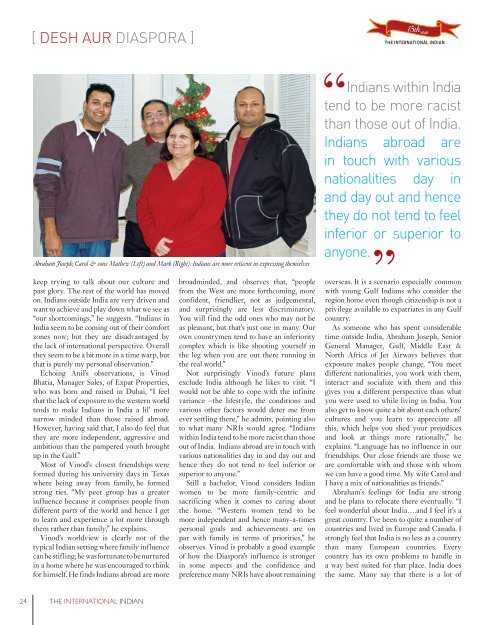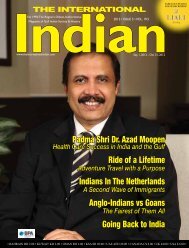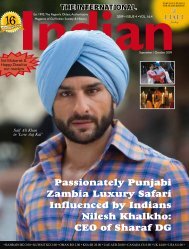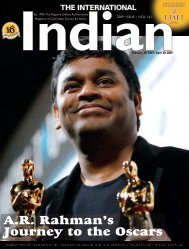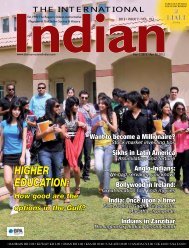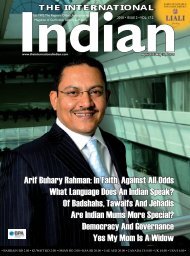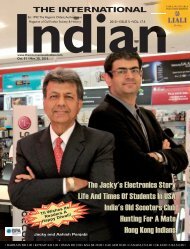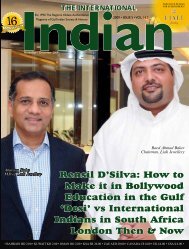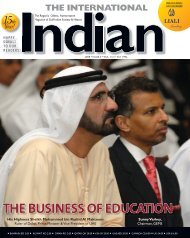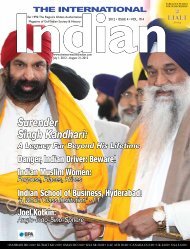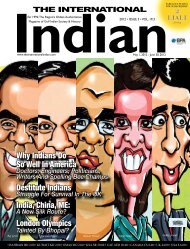THE INTERNATIONAL - International Indian
THE INTERNATIONAL - International Indian
THE INTERNATIONAL - International Indian
You also want an ePaper? Increase the reach of your titles
YUMPU automatically turns print PDFs into web optimized ePapers that Google loves.
[ DEsH Aur DiAsporA ]<br />
Abraham Joseph, Carol & sons Mathew (Left) and Mark (Right): <strong>Indian</strong>s are more reticent in expressing themselves<br />
keep trying to talk about our culture and<br />
past glory. The rest of the world has moved<br />
on. <strong>Indian</strong>s outside India are very driven and<br />
want to achieve and play down what we see as<br />
“our shortcomings,” he suggests. “<strong>Indian</strong>s in<br />
India seem to be coming out of their comfort<br />
zones now; but they are disadvantaged by<br />
the lack of international perspective. Overall<br />
they seem to be a bit more in a time warp, but<br />
that is purely my personal observation.”<br />
Echoing Anil’s observations, is Vinod<br />
Bhatia, Manager Sales, of Expat Properties,<br />
who was born and raised in Dubai, “I feel<br />
that the lack of exposure to the western world<br />
tends to make <strong>Indian</strong>s in India a lil’ more<br />
narrow minded than those raised abroad.<br />
However, having said that, I also do feel that<br />
they are more independent, aggressive and<br />
ambitious than the pampered youth brought<br />
up in the Gulf.”<br />
Most of Vinod’s closest friendships were<br />
formed during his university days in Texas<br />
where being away from family, he formed<br />
strong ties. “My peer group has a greater<br />
influence because it comprises people from<br />
different parts of the world and hence I get<br />
to learn and experience a lot more through<br />
them rather than family,” he explains.<br />
Vinod’s worldview is clearly not of the<br />
typical <strong>Indian</strong> setting where family influence<br />
can be stifling; he was fortunate to be nurtured<br />
in a home where he was encouraged to think<br />
for himself. He finds <strong>Indian</strong>s abroad are more<br />
broadminded, and observes that, “people<br />
from the West are more forthcoming, more<br />
confident, friendlier, not as judgemental,<br />
and surprisingly are less discriminatory.<br />
You will find the odd ones who may not be<br />
as pleasant, but that’s just one in many. Our<br />
own countrymen tend to have an inferiority<br />
complex which is like shooting yourself in<br />
the leg when you are out there running in<br />
the real world.”<br />
Not surprisingly Vinod’s future plans<br />
exclude India although he likes to visit. “I<br />
would not be able to cope with the infinite<br />
variance –the lifestyle, the conditions and<br />
various other factors would deter me from<br />
ever settling there,” he admits, pointing also<br />
to what many NRIs would agree. “<strong>Indian</strong>s<br />
within India tend to be more racist than those<br />
out of India. <strong>Indian</strong>s abroad are in touch with<br />
various nationalities day in and day out and<br />
hence they do not tend to feel inferior or<br />
superior to anyone.”<br />
Still a bachelor, Vinod considers <strong>Indian</strong><br />
women to be more family-centric and<br />
sacrificing when it comes to caring about<br />
the home. “Western women tend to be<br />
more independent and hence many-a-times<br />
personal goals and achievements are on<br />
par with family in terms of priorities,” he<br />
observes. Vinod is probably a good example<br />
of how the Diaspora’s influence is stronger<br />
in some aspects and the confidence and<br />
preference many NRIs have about remaining<br />
“<br />
indians within india<br />
tend to be more racist<br />
than those out of india.<br />
indians abroad are<br />
in touch with various<br />
nationalities day in<br />
and day out and hence<br />
they do not tend to feel<br />
inferior or superior to<br />
anyone.<br />
”<br />
overseas. It is a scenario especially common<br />
with young Gulf <strong>Indian</strong>s who consider the<br />
region home even though citizenship is not a<br />
privilege available to expatriates in any Gulf<br />
country.<br />
As someone who has spent considerable<br />
time outside India, Abraham Joseph, Senior<br />
General Manager, Gulf, Middle East &<br />
North Africa of Jet Airways believes that<br />
exposure makes people change. “You meet<br />
different nationalities, you work with them,<br />
interact and socialize with them and this<br />
gives you a different perspective than what<br />
you were used to while living in India. You<br />
also get to know quite a bit about each others’<br />
cultures and you learn to appreciate all<br />
this, which helps you shed your prejudices<br />
and look at things more rationally,” he<br />
explains. “Language has no influence in our<br />
friendships. Our close friends are those we<br />
are comfortable with and those with whom<br />
we can have a good time. My wife Carol and<br />
I have a mix of nationalities as friends.”<br />
Abraham’s feelings for India are strong<br />
and he plans to relocate there eventually. “I<br />
feel wonderful about India….and I feel it’s a<br />
great country. I’ve been to quite a number of<br />
countries and lived in Europe and Canada. I<br />
strongly feel that India is no less as a country<br />
than many European countries. Every<br />
country has its own problems to handle in<br />
a way best suited for that place. India does<br />
the same. Many say that there is a lot of<br />
24<br />
<strong>THE</strong> <strong>INTERNATIONAL</strong> INDIAN


